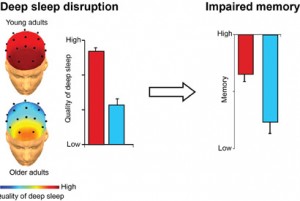Sleep Quality Linked to Memory Frontal Lobe Size
Researchers have confirmed that loss of memory as we get older is linked to poor sleep quality and atrophy of the brain’s prefrontal lobe.
In this article
Sleep research and memory
Previous studies have confirmed the relationship between cognition and sleep quality. Now researchers from the Sleep and Neuroimaging Laboratory at the University of California at Berkeley have furthered this investigation. Led by UC Berkeley associate professor of psychology and neuroscience Matthew Walker, Ph.D., the scientists compared memory, sleep quality and frontal lobe size. The researchers tested 18 healthy young adults and 15 healthy older adults.
The subjects were primarily in their 20s while the older adults were primarily in their 70s. Before they went to bed they were given 120 word sets to remember. They were tested for memorization of the word sets.
As they were sleeping, brainwave tests using electroencephalopathy (EEG) equipment were measured. This measures the brain’s waveforms, illustrating the extent and potential lack of slow wave activity associated with good quality sleep.
In the morning the subjects were then tested once again on the same word pairs, while being given MRI scans (magnetic resonance imaging).
(Note: This article does not attest to the long-term safety of repeated MRI scans – See “Electromagnetic Health” for more information on potential MRI scan risks).
Lack of slow wave sleep
In comparing the MRI scans with the EEG tests, the researchers found an association between the lack of slow wave activity during sleep and the deterioration of the middle frontal lobe of the prefrontal cortex.
On average the older adults had 75% less slow wave sleep. In other words, their sleep quality was 75% worse than the younger subjects. Their word recall was also 55% worse than the word recall of the younger subjects.
According to the researchers, this illustrated that the increased slow wave sleep allowed the younger subjects to likely more efficiently transfer memories from the hippocampus to the prefrontal cortex.
“What we have discovered is a dysfunctional pathway that helps explain the relationship between brain deterioration, sleep disruption and memory loss as we get older,” commented Dr. Walker. “When we are young, we have deep sleep that helps the brain store and retain new facts and information. But as we get older, the quality of our sleep deteriorates and prevents those memories from being saved by the brain at night.”
Other sleep research confirms findings
This is not the first study that has connected frontal lobe function with sleep quality. In 2001, researchers from Liverpool’s John Moores University found a link between the two.
The fact that the frontal lobe decreases in size as a person ages has also been established in previous research. In 2009, University of Oslo researchers found that the prefrontal cortices deteriorated an average of 0.5% among healthy adults, and generally more among adults with mild Alzheimer’s disease.
By 2007, several studies had thoroughly linked sleep quality to poor lack of cognitive health, as summarized in a large review of research at Finland’s University of Turku.
And more recent research – such as a late 2012 study from Germany’s Max Planck Institute of Psychiatry – has confirmed that academic performance is linked with sleep quality. In this study, 144 medical students underwent sleep studies while before taking board exams. The research found that poor performance was connected to poor sleep quality among the students.
The association between the three – sleep quality, frontal lobe size and memory – was confirmed in this study.
Other research has linked Alzheimer’s disease with sleep quality as well.
REFERENCES:
Mander BA, Rao V, Lu B, Saletin JM, Lindquist JR, Ancoli-Israel S, Jagust W, Walker MP. Prefrontal atrophy, disrupted NREM slow waves and impaired hippocampal-dependent memory in aging. Nat Neurosci. 2013 Jan 27.
Jones K, Harrison Y. Frontal lobe function, sleep loss and fragmented sleep. Sleep Med Rev. 2001 Dec;5(6):463-475.
Ahrberg K, Dresler M, Niedermaier S, Steiger A, Genzel L. The interaction between sleep quality and academic performance. J Psychiatr Res. 2012 Dec;46(12):1618-22.
Alhola P, Polo-Kantola P. Sleep deprivation: Impact on cognitive performance. Neuropsychiatr Dis Treat. 2007;3(5):553-67.
Fjell AM, Walhovd KB, Fennema-Notestine C, McEvoy LK, Hagler DJ, Holland D, Brewer JB, Dale AM. One-year brain atrophy evident in healthy aging. J Neurosci. 2009 Dec 2;29(48):15223-31.
















